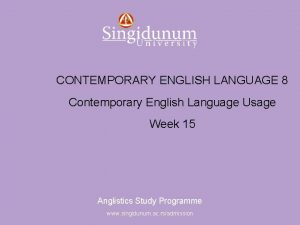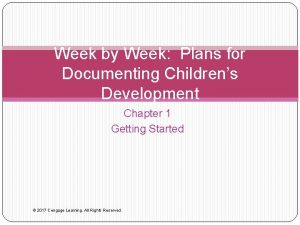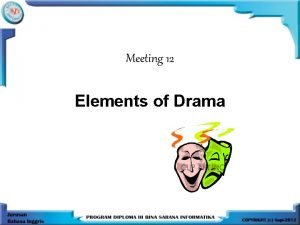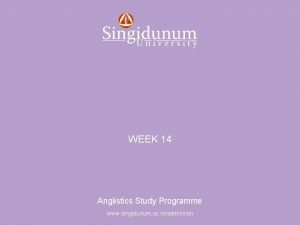Anglistics Study Programme Drama Film Literature 2 Week











- Slides: 11

Anglistics Study Programme Drama, Film, Literature 2 Week 9 Anglistics Study Programme www. singidunum. ac. rs/admission

Anglistics Study Programme Macbeth • Macbeth was first performed in 1606 on the stage of Globe theatre in London. However, the play was first published in 1623. • This tragedy was rather successful in Shakespeare’s time (as it is today) possibly due to the fact that its main theme was slaying of a king. • Shakespeare wrote this tragedy upon James I coming to the throne and it was no coincidence that Shakespeare chose to write about a theme from the Scottish history. It is believed that this play was a sort of praise to the new king (though opposing opinions can be found as well) • Shakespeare got the idea for the plot from the Holinshed’s Chronicles (a large, comprehensive description of British history published in three volumes (England, Scotland Ireland)

Anglistics Study Programme The plot • The plot of the tragedy is rather an ‘economical’ one. There are no episodes, no supporting characters or digressions. The tragedy is focused on the main character and the events that predestine the fatal outcome of Macbeth’s excessive ambition. • The tragedy is divided into five acts.

Anglistics Study Programme Themes • Ambition – Macbeth’s true downfall is his ambition. Macbeth sacrifices his ethical values to his ambition – this may be seen as a consequence of certain ignorance of his (he knows what he is doing, but he is not aware of the consequences of his actions). Lady Macbeth also shows ambition. They both fail to see how ambition forces them to cross the line and thus leading them to their downfall • Guilt – Macbeth’s guilt is represented in hallucinations that he sees (bloody dagger, the ghost of Banquo), whereas Lady Macbeth’s guilt (her part in King Duncan’s murder) drives her to insanity and suicide. • Love – it is a paradox of this tragedy. Namely, strong love between two people leads them into crime and death. Love does not seem to be acting for the purpose of good, morally correct, and wise, but actually leads to dehumanization. Love invested in achievement of this monstrous ambition actually sacrifices itself.

Anglistics Study Programme • Female influence, represented through the witches and Lady Macbeth, and as dangerous and bad as it may seem, it is not capable of creating ambition where there is none, but it can awaken it and encourage to act on it • Nothing seems as it is – Macbeth’s bravery as a warrior becomes its opposite (he is prepared to kill violently, to act inconsiderately just to get what he wants) and Lady Macbeth’s obedience and hospitality turn out to be a disguise for the bloodthirsty ambition and monstrous calculation

Anglistics Study Programme Motifs & symbols Motifs are: • hallucinations – serve as a reminder of the Macbeths culpability • prophecy – it sets the action in motion • violence – Macbeth is considered as a violent play, but, interestingly, most of the killings take place offstage; the play is also about the pathology of crime: violence breeds violence, the first crime is never the last one Symbols in Macbeth are: • blood – symbolizes the guilt • weather – reflects corruption in moral and political orders (violation of natural order seen in thunder, lighting, and storms)

Anglistics Study Programme Macbeth as a tragic hero • What is a tragic hero? • Is Macbeth a tragic hero? • Macbeth’s tragedy can be seen as a consequence of his actions, his free choices which he made without anyone forcing him to do so. As every tragic hero, he is a victim of the part of his personality which he does not understand fully and though he feels a certain resistance to this part of his nature, at the same time, he is compelled by it to act against his own principles. • When silencing his consciousness, Macbeth also suffocates his humanity, and, thus, his struggle against moral considerations cannot be ended in any other way, but in self-destruction • In order to prevent Macbeth from being judged and condemned, Shakespeare resorted to a technique where he basically represented a villain as a human being that anyone can relate to

Anglistics Study Programme • Also, Shakespeare leaves out Macbeth’s crimes (not shown on stage) but not his internal struggle before the crime and afterwards. Therefore, murder of the King is seen in the light of remorse of perpetrator. (The victim of the crime was presented just as a royal figure and not as thoroughly and in details as was the protagonist. • Shakespeare managed to make us feel for the killer and not for the victim whom we know nothing about – we are more willing to feel Macbeth’s remorse than to judge him for the crimes • Every next victim becomes more personalized (Banquo, Macduff, etc.

Anglistics Study Programme Lady Macbeth • Lady Macbeth is a model of a determined and uncompromising wife who has not seen in Shakespeare’s plays before. • Lady Macbeth and Macbeth complete psychologically – she has the will and resolution to start with this high-risk endeavour of getting to the throne, and he is strong enough to persist in the endeavour • Up to the moment the killings start, she is rhetorically efficient, inconsiderate and determined, but when she enters the web of crime, she becomes overwhelmed by all the feelings and considerations • There are two possible versions how Lady Macbeth might be understood – the first one, as a cruel, cold-hearted offender, or as an overly sensitive woman who took part in the events that were about to happen

Anglistics Study Programme • Her strength lies in her disturbed moral criteria – she sees goodness and nobility as weaknesses because they restrain ambition, and the act of killing Duncan she perceives as a heroic deed for it confirms the very same ambition (this is obvious in her speeches which she uses to manipulate her husband into persisting in his ambition • It is interesting to see how she is the one who constantly reassures her husband gives him strength. However, the moment she starts showing signs of weakness (that will end in her insanity and suicide), the two of then stop talking and until the end they have no scenes in which they talk to each other on their own • From the very beginning Macbeth was confronting his consciousness and moral consequences of his actions and that is why, paradoxically, the pressure weakened • Lady Macbeth suppressed her moral dilemmas from her thoughts, and this was precisely what brought remorse and regret as boomerang in the form of her insanity, hallucinations, and tragic end.

Anglistics Study Programme Interesting facts • Macbeth is one of the most often played Shakespeare’s play • There are several transpositions into movies, modern culture, as well as in opera – Giuseppe Verdi wrote an opera also titled Macbeth • Scottish play – euphemism most commonly used in theatre to refer to this play. This is due to superstition according to which an actor must not utter the name of the play as long as he/she is in theatre. It was considered that the play with its theme and rituals on scene can summon the evil spirits that can cause for some accident to happen to the actor. (O. Wells, C. Heston, etc. did suffer some accidents while playing this tragedy) • Macbeth is full of dark scenes and bad lighting and battles on stage can be the cause of all these accidents





















